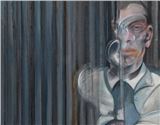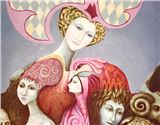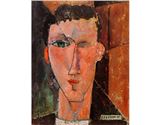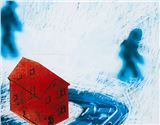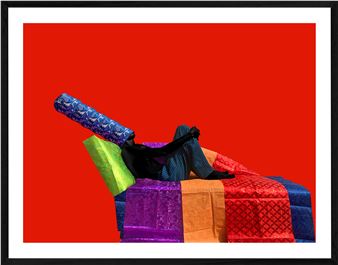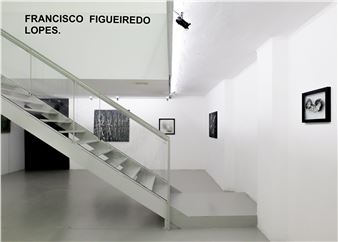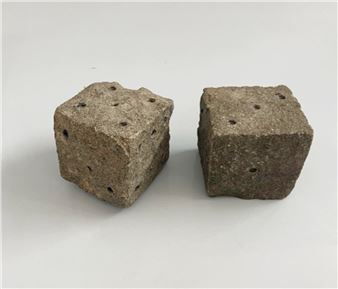Julian Opie
Duarte Sequeira is excited to present a solo exhibition by Julian Opie.
Julian Opie's new exhibition at Duarte Sequeira Gallery presents a compelling investigation into movement, identity, and representation through a major installation dedicated to the figure of the sprinter.
Bringing together life-sized installations, LED works, and portraiture, Opie stages a study of the body in motion as both a for- mal device and a cultural symbol. The exhibition functions as a dynamic environment where viewers are invited not only to witness but to navigate the interplay between motion, image, and repetition. Opie's visual language is grounded in reduction. His stylised figures, stripped of detail yet meticulously observed, reconfigure the familiar into the symbolic.
In this exhibition, the sprinter is transformed into an elemental figure of contemporary life-an icon of discipline, endurance, and progress. The installation unfolds as a choreography of forms, where the act of running is abstracted into a sequence of gestures that oscillate between human specificity and generic typology. The LED works provide a pulse through the exhibition space. Drawing upon the aesthetics of public signage, these works repeat loops of animated figures in perpetual motion. The effect is hypnotic, suggesting both the mechanical precision of the athlete and the visual saturation of urban environments. Here, motion is not merely depicted but enacted through technology. These works do not capture a singular moment but extend it, creating an architecture of time where movement is endlessly deferred yet continually present. In counterpoint to this relentless flow, the sprinter portraits offer a moment of stillness. Isolated from action, these frontal, tightly framed depictions assert the individuality of the athletes. Their expressions are composed, introspective, and self-contained. This stillness is not at odds with the surrounding motion but integral to it. It reminds us that the performance of speed is always underpinned by moments of self-awareness and self-presentation. In this way, Opie subtly positions the sprinter as both subject and construct-as athlete, as icon, and as data. Throughout the installation, Opie's economy of means is matched by the complexity of his inquiry.
The exhibition is situated within broader discourses of spectator- ship, digital mediation, and the abstraction of the human body. His work engages with the lineage of classical friezes, kinetic art, and contemporary screen culture, all while maintaining a rigorous formal clarity. What emerges is not a celebration of athleticism in itself, but a meditation on the conditions through which bodies are made visible, repeatable, and legible.

Recommended for you
Duarte Sequeira is excited to present a solo exhibition by Julian Opie.
Julian Opie's new exhibition at Duarte Sequeira Gallery presents a compelling investigation into movement, identity, and representation through a major installation dedicated to the figure of the sprinter.
Bringing together life-sized installations, LED works, and portraiture, Opie stages a study of the body in motion as both a for- mal device and a cultural symbol. The exhibition functions as a dynamic environment where viewers are invited not only to witness but to navigate the interplay between motion, image, and repetition. Opie's visual language is grounded in reduction. His stylised figures, stripped of detail yet meticulously observed, reconfigure the familiar into the symbolic.
In this exhibition, the sprinter is transformed into an elemental figure of contemporary life-an icon of discipline, endurance, and progress. The installation unfolds as a choreography of forms, where the act of running is abstracted into a sequence of gestures that oscillate between human specificity and generic typology. The LED works provide a pulse through the exhibition space. Drawing upon the aesthetics of public signage, these works repeat loops of animated figures in perpetual motion. The effect is hypnotic, suggesting both the mechanical precision of the athlete and the visual saturation of urban environments. Here, motion is not merely depicted but enacted through technology. These works do not capture a singular moment but extend it, creating an architecture of time where movement is endlessly deferred yet continually present. In counterpoint to this relentless flow, the sprinter portraits offer a moment of stillness. Isolated from action, these frontal, tightly framed depictions assert the individuality of the athletes. Their expressions are composed, introspective, and self-contained. This stillness is not at odds with the surrounding motion but integral to it. It reminds us that the performance of speed is always underpinned by moments of self-awareness and self-presentation. In this way, Opie subtly positions the sprinter as both subject and construct-as athlete, as icon, and as data. Throughout the installation, Opie's economy of means is matched by the complexity of his inquiry.
The exhibition is situated within broader discourses of spectator- ship, digital mediation, and the abstraction of the human body. His work engages with the lineage of classical friezes, kinetic art, and contemporary screen culture, all while maintaining a rigorous formal clarity. What emerges is not a celebration of athleticism in itself, but a meditation on the conditions through which bodies are made visible, repeatable, and legible.

 ARTISTS
ARTISTS
